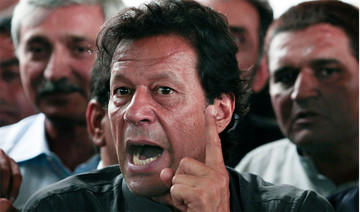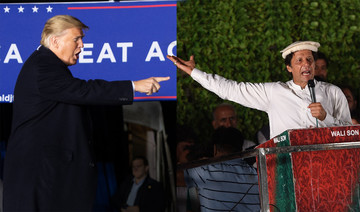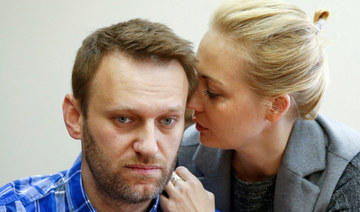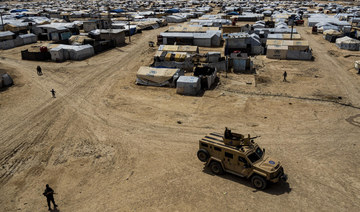ISLAMABAD: Prime Minister Imran Khan on Monday acknowledged receiving a letter from US President Donald Trump seeking Pakistan’s help in the Afghan peace process.
During a meeting in the federal capital today (Monday), PM Khan said: “In the letter, Trump has asked Pakistan to play its role in the Afghan peace talks which are aimed at catalyzing an end to the 17-year war in Afghanistan.”
Pakistan was one among several countries who had met in Geneva on November 27 to discuss reforms for Afghanistan and peace prospects in the region. During the two-day conference, Afghan leaders and international diplomats sat together to deliberate upon whether or not strategies and aid offered to Afghanistan were helping resolve the quagmire created by the prolonged war, paving way for the withdrawal of foreign troops.
The letter comes only days after the US president launched another tirade at Pakistan, accusing it of being another country that would “take from the United States (US) without giving anything in return”.
On November 19, Trump had tweeted, “....We no longer pay Pakistan the $billions because they would take our money and do nothing for us, Bin Laden being a prime example, Afghanistan being another. They were just one of many countries that take from the United States without giving anything in return. That’s ENDING!”
While PM Khan responded in a befitting manner “setting the record straight”, ties between the two nations have since been strained.
PM Khan told journalists that previously, Pakistan had been apologetic in its dealings and relations with the US but his government has and will continue to deal with the country on equal terms. The premier assured Washington that Pakistan would play any role possible for peace in Afghanistan.
Trump seeks Pakistan’s help in Afghan peace process
Trump seeks Pakistan’s help in Afghan peace process
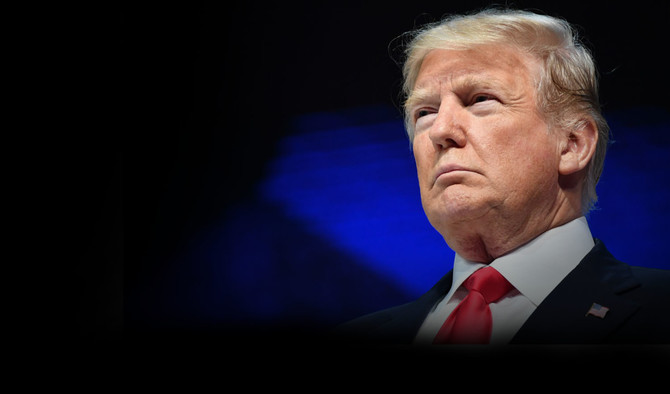
- US president writes to Pakistan PM to end decades-old war
- Islamabad assures Washington of every support possible for the purpose
US repatriates two dozen Westerners from Syria Daesh camp
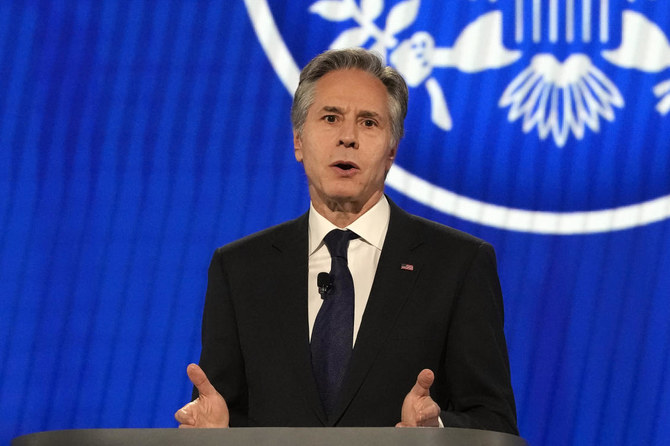
In a complex operation involving US agencies, Kuwait and pro-US Kurdish fighters, the United States repatriated 11 US citizens, including five minors, as well as a nine-year-old non-US sibling of an American, Secretary of State Antony Blinken said.
The United States in the same operation facilitated the repatriation of six Canadian citizens, four Dutch citizens, and one Finnish citizen, among them eight children, he said.
“This is the largest single repatriation of US citizens from northeast Syria to date,” Blinken said in a statement.
“The only durable solution to the humanitarian and security crisis in the displaced persons camps and detention facilities in northeast Syria is for countries to repatriate, rehabilitate, reintegrate and, where appropriate, ensure accountability for wrongdoing,” he said.
The United States has long pushed European governments to bring back nationals who went to fight for the Daesh group — or their children.
Most European countries have done so but slowly and despite initial reservations, especially in countries with a history of jihadist attacks at home such as France and Britain.
Blinken did not identify the people who were repatriated.
The New York Times, quoting unidentified sources, said they included an American woman, whose Turkish husband apparently took the family to Islamic State territory and was later killed, and their nine children.
The Star Tribune of Minneapolis reported last week that a man who joined Islamic State but then became a valuable informant was seeking the repatriation of two sons, one apparently the non-US citizen, to be raised by their grandparents in Minnesota.
The repatriations remain controversial in the United States as well, with the administration of former president Donald Trump in one prominent case insisting that a young woman seeking to return was not legitimately a US citizen.
The Kurdish-led Syrian Democratic Forces (SDF) helped US forces crush the Daesh group.
Five years after the extremists were ousted from their last territory, the SDF still holds more than 56,000 detainees with alleged or perceived links to the Daesh group.
Kurdish authorities have been asking foreign governments to repatriate their nationals but Western governments have responded slowly for fear of domestic backlash.
Putin starts new six-year term with challenge to the West
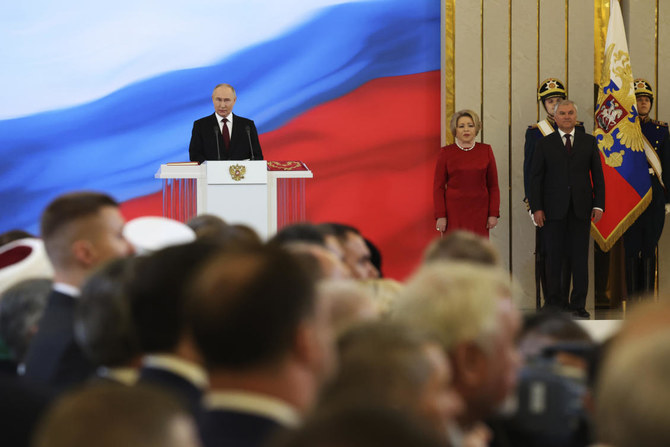
- Putin is sworn in for fifth term
- US and many EU states stay away
- Putin says he’s not ending dialogue with West
MOSCOW: Russian President Vladimir Putin said it was up the West to choose between confrontation and cooperation as he was sworn in for a new six-year term on Tuesday at a Kremlin ceremony that was boycotted by the United States and many of its allies.
More than two years into the war in Ukraine, Putin said he wanted to “bow” before Russia’s soldiers there and declared in his inauguration speech that his landslide re-election in March was proof the country was united and on the right track.
“You, citizens of Russia, have confirmed the correctness of the country’s course. This is of great importance right now, when we are faced with serious challenges,” he told dignitaries in a gilded Kremlin hall where a trumpet fanfare sounded to greet his arrival.
“I see in this a deep understanding of our common historical goals, a determination to adamantly defend our choice, our values, freedom and the national interests of Russia.”
At 71, Putin dominates the domestic political landscape. Leading opposition figures are in prison or exile, and his best known critic, Alexei Navalny, died suddenly in an Arctic penal colony in February.
Yulia Navalnaya, the late dissident’s wife, urged supporters in a video on Tuesday to keep up the struggle against Putin. “With each of his terms, everything only gets worse, and its’ frightening to imagine what else will happen while Putin remains in power,” she said.
On the international stage, Putin is locked in a confrontation with Western countries he accuses of using Ukraine as a vehicle to try to defeat and dismember Russia.
Putin told Russia’s political elite after being sworn in that he was not rejecting dialogue with the West, including on nuclear weapons.
“The choice is theirs: do they intend to continue trying to restrain the development of Russia, continue the policy of aggression, incessant pressure on our country for years, or look for a path to cooperation and peace?” he said.
With Russia’s troops advancing gradually in eastern Ukraine, the top US intelligence official said last week that Putin appeared to see domestic and international developments trending in his favor and the conflict was unlikely to end anytime soon.
It remains unclear how far Putin will seek to press the war and on what terms he might discuss ending it — decisions that will depend in part on whether Joe Biden or Donald Trump wins the US presidential election in November. Ukraine says peace can only come with a full withdrawal of Russia’s troops, who control nearly 20 percent of its territory.
Western absentees
Putin, in power as president or prime minister since 1999, will surpass Soviet leader Josef Stalin and become Russia’s longest-serving ruler since 18th century Empress Catherine the Great if he completes a new six-year term. He would then be eligible to seek re-election again.
He won victory by a record margin in a tightly controlled election from which two anti-war candidates were barred on technical grounds. The opposition called it a sham.
The United States, which said it did not consider his re-election free and fair, stayed away from Tuesday’s ceremony.
Britain, Canada and most EU nations also decided to boycott the swearing-in, but France said it would send its ambassador.
Ukraine said the event sought to create “the illusion of legality for the nearly lifelong stay in power of a person who has turned the Russian Federation into an aggressor state and the ruling regime into a dictatorship.”
Sergei Chemezov, a Putin ally, told Reuters before the ceremony, that Putin brought stability, something which even his critics should welcome.
“For Russia, this is the continuation of our path, this is stability – you can ask any citizen on the street,” he said.
Nuclear tensions
Russia’s relations with the United States and its allies are at their lowest point since the Cuban Missile Crisis of 1962, when the world came to the brink of nuclear war.
The West has provided Ukraine with artillery, tanks and long-range missiles, but NATO troops have not joined the conflict directly, something that both Putin and Biden have warned could lead to World War Three.
Underscoring the rise in nuclear tensions, Russia said on Monday it would practice the deployment of tactical nuclear weapons as part of a military exercise, after what it said were threats from France, Britain and the United States.
One of the decisions awaiting Putin in his new term will be whether to seek to renew or replace the last remaining treaty that limits Russian and US strategic nuclear warheads. The New START agreement is due to expire in 2026.
In line with the constitution, the government resigned at the start of the new presidential term. Putin ordered it to remain in office while he appoints a new one which is expected to include many of the same faces.
Modi, Gandhi urge more Indians to vote as election reaches halfway mark
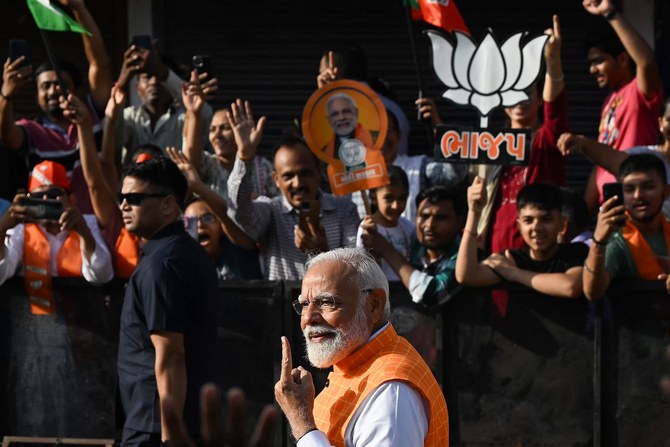
- Voter turnout in the first 2 phases of election was lower than in 2019
- With phase 3 complete, half of voters should have already cast ballots
New Delhi: Prime Minister Narendra Modi and his chief opponent Rahul Gandhi called on voters to cast their ballots on Tuesday, as India’s massive general election reached its halfway mark with a turnout lower than expected.
More than 968 million people have been registered to vote and the polls are held in seven phases from April 19 until June 1. Some of India’s 28 states and eight federally governed territories complete the process on a single day, while others spread it out.
The first two phases of the election were held on April 19 and April 26 in 190 constituencies, with a voter turnout of 66.1 percent and 66.7 percent respectively — about 4 percent lower than in 2019.
In the third phase on Tuesday, citizens from 94 constituencies in 12 states went to the polls, including in Modi’s home state of Gujarat.
“Urging all those who are voting in today’s phase to vote in record numbers. Their active participation will certainly make the elections more vibrant,” the incumbent prime minister said on X after casting his ballot.
Modi is eyeing a rare third straight five-year term in power, targeting 400 seats for the National Democratic Alliance led by his Hindu nationalist Bharatiya Janata Party, which has been in power since 2014.
He is challenged by an alliance of two dozen opposition parties — the Indian National Developmental Inclusive Alliance, or INDIA, led by the Congress Party, which has ruled the country for close to 45 years since its independence in 1947.
Gandhi, Modi’s key contender and Congress leader, is the son of Rajiv Gandhi, a grandson of Indira Gandhi, and a great-grandson of Jawaharlal Nehru — all of whom had served as prime ministers of India.
Congress plunged to a historic low when it was swept out of power by the BJP in the 2014 election, and won its second-lowest number of 52 seats in 2019.
As the turnout showed a declining trend in the first and second phases of the ongoing poll, Gandhi also took to social media to ask voters to show up.
“I request all of you to come out in large numbers and vote to protect your rights,” he said. “Remember, this is not an ordinary election, it is an election to protect the democracy and constitution of the country.”
More than 498 million people were eligible to vote in the first three phases, or 60 percent of all registered voters. The total number of parliamentary seats up for grabs is 283 out of 543.
The party or coalition that wins at least 272 seats will form the government.
Although surveys suggest Modi will win a majority in parliament easily, analysts say a repeat of his landslide victories in 2014 and 2019 is unlikely.
“I think the election has not gone very satisfactorily for the ruling party led by Prime Minister Narendra Modi. The results may be well below their expectations,” said Anand K. Sahay, a columnist and commentator based in Delhi.
“My own broad sense is that the government is in the doldrums.”
He said Modi was repeating his previous strategy of mobilizing voters through majoritarian Hindu sentiment, omitting the voters’ main concerns, which pre-poll surveys have identified as unemployment and inflation.
“The prime minister of India is holding on to one single narrative, that is ranting against the Muslims of India. A man who regards himself as a very successful prime minister for 10 consecutive years is not talking about issues and the records of the governance. There is a deafening silence on that front,” Sahay told Arab News.
Apoorvanand Jha, a public intellectual and professor at the University of Delhi, said voters were now “weary” of the rhetoric propagated by the BJP, but it was not clear whether that would result in a regime change.
“What people have realized now is that it is only political rhetoric and, actually, there is no governance, so that has created a feeling of unease even in the supporters of this regime,” he said.
“One does not know whether that will lead to a major change or not. But this is a major shift. The myth of the invincibility of Narendra Modi is broken and the myth of the popularity of Narendra Modi is also something that people have started questioning.”
Two suspected Kashmir rebels killed in clash with Indian forces
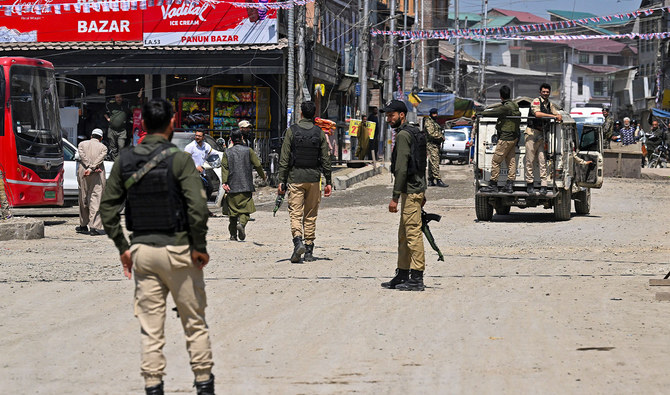
- Firefight between suspected rebels, soldiers takes place amid national elections in disputed territory
- Divided between nuclear-armed India and Pakistan since 1947, Kashir is claimed by both countries in full
SRINAGAR, India: Two suspected rebels were killed in Indian-administered Kashmir during a firefight with soldiers, police said Tuesday, at a time when campaigning for national elections is underway in the disputed territory.
Scores of soldiers besieged a residential area in southern Kulgam district, some 70 kilometers (43 miles) from Kashmir’s biggest city Srinagar, on Monday after armed militants were suspected to be present inside a house.
Two bodies of the suspected rebels “were recovered so far” from the site, police said in a statement posted Tuesday on social media platform X.
Images from the area showed smoke billowing from a house after it caught fire during the skirmish.
Kashmir has been divided between India and Pakistan since their independence in 1947, with both claiming the Himalayan territory in full.
Rebel groups opposed to Indian rule have for decades waged an insurgency in Indian-controlled Kashmir, demanding either independence or a merger with Pakistan.
The conflict has left tens of thousands of civilians, soldiers and militants dead.
Violence and anti-India protests have drastically reduced since 2019, when Prime Minister Narendra Modi’s government canceled the Muslim majority region’s limited autonomy.
But clashes between security forces and rebel groups have increased since voting began last month in India’s six-week election.
Three suspected rebels were killed and a police officer and three soldiers wounded in three separate clashes across the territory in April.
Militants ambushed a military convoy in Kashmir’s south on Sunday, killing one Indian air force corporal and wounding four other troops.
Trinidad, Tobago urged to repatriate women, children from Iraq
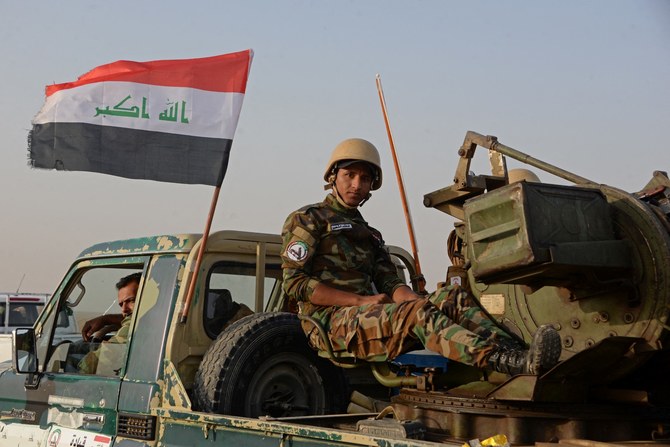
- A number of its citizens are being held in detention for alleged involvement with Daesh
- Human Rights Watch: Innocent children have been denied proper access to education, healthcare, nutritious food
London: Human Rights Watch has urged the government of Trinidad and Tobago to repatriate a number of its citizens from Iraq being held in detention for alleged involvement with Daesh.
HRW said four Trinidadian women have been held by authorities in Iraq along with seven children, aged 7-15 years, for almost seven years.
It said it had been in contact with one mother, currently in Rusafa prison, who on May 2 told them in a voice recording that her two sons, aged 13 and 15 — one of whom suffers from asthma, anaemia and malnutrition — had been taken away from her.
“They took my son from me, they told me he was too big to be staying in a cell with us. They put him in a cell with about 10 boys,” she said.
“We have no education for our children. Nothing. We are going on our seventh year in prison and our children are growing up here.”
Another mother told HRW on May 4: “We are here just waiting, and time is wasting. Our children remain uneducated without any knowledge.”
Rusafa is believed to hold around 100 youths as well as their mothers, with many of the adults foreign nationals charged with or convicted of terrorism-related crimes.
Three of the four Trinidadian women are being held there, serving sentences of 20 years or more.
The fourth is being held with her two children in the city of Erbil in Iraqi Kurdistan, where she has completed her sentence but cannot leave without government help.
Jo Becker, children’s rights advocacy director at HRW, said: “Trinidad and Tobago has publicly promised that it would bring home its nationals from Iraq and Syria, but not a single Trinidadian has returned home in more than five years.
“These children, who are not responsible for any crime, should be in school in Trinidad and Tobago, not languishing in an Iraqi prison.”
The four women from Trinidad and Tobago told HRW that they are prepared to have their children repatriated even if it means they must stay in Iraq, but have had no word on a decision by the government despite communicating with the repatriation committee established by Trinidadian Prime Minister Keith Rowley in March 2023.
HRW said the Trinidadian authorities should look to repatriate the children as they have been denied proper access to education, healthcare and nutritious food.
In a statement, it said: “The Iraqi and Trinidadian authorities should weigh the children’s best interests and right to family unity and consider repatriating both the children and their mothers, so their children could regularly visit their mothers as they serve out their sentences in Trinidad and Tobago.”
Becker added: “Trinidad and Tobago’s prime minister has pledged to bring the Trinidadians detained in Iraq and Syria home. He shouldn’t wait any longer.”



